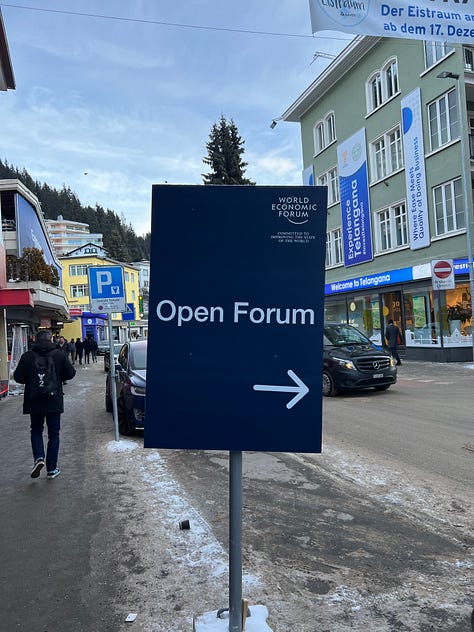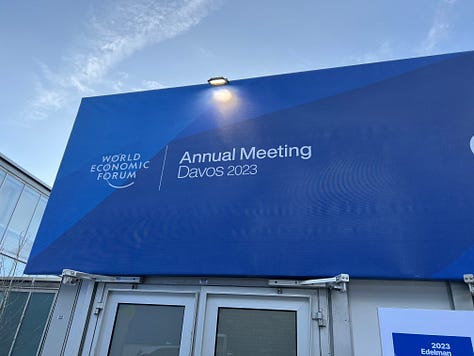Week 3: A wall talking to itself (a report from Davos)
In this issue: ▸ A wall talking to itself ▸ The same framing the last 40 years ▸ Now government intervention is 'smart' ▸ No executive power, but still some value ▸ Phantom credits ▸ And much more...
Dear all,
Davos. A wall talking to itself.
This year’s Davos theme was ‘cooperation in a fragmented world’. A theme that ensured that the really difficult topics where not discussed. Cooperation, yes, but in relation to what and cooperation between who?
In the past two years, the richest 1% accumulated nearly twice as much new wealth as the rest of the world, according to an Oxfam report, also published this week.
There are roughly 116 billionaires attending Davos this year’s event, 40% more than a decade ago. In addition to the absent Russians, there are none from China this year, with the nation still reeling from a spike in Covid cases and swooning stock market that erased $224 billion from the fortunes of the country’s richest people in 2022.
India, a consistently big presence in Davos in prior years, has 13 billionaires attending, including coal magnate-turned-diversified industrialist Gautam Adani, whose wealth soared by $44 billion last year. He’s currently the fourth-richest person in the world, according to the Bloomberg Billionaires Index. Almost a third of all the Filipinos attending lay claim to 10-digit fortunes.
For years, Davos has prided itself on its climate agenda but, with attending officials from companies the most responsible for greenhouse gas emissions unwilling to move, it has mostly been talking to a wall. Basically, a wall talking to itself, if you can picture that.
“I am not convinced that the wealthier world truly grasps the degree of frustration and anger in the Global South,” Guterres told Davos delegates. I saw him talking to the elites on Wednesday. “We are in the worst situation of my lifetime,” UN Secretary-General António Guterres told the forum delegates warning that the world is in a ‘sorry state’.
Guterres condemned ‘Big Oil’ for ignoring its own climate science, accusing the oil and gas industry of seeking to expand production knowing “full well” that their business model is incompatible with human survival.
“Benchmarks and criteria [for net-zero commitments] are often dubious or murky,” he added. Meanwhile, the world’s largest financial institutions and their executives continue to pour hundreds of billions of dollars into an industry producing and burning fossil fuels, according to an NGO report published ahead of the forum this week.



The same framing in Davos the last 40 years
A fragmented world is a great theme, but the outcome of some of the discussions I listened to in Davos points more towards fragmented realities and fragmented truth.
The framing of the discussion matters, yet the framing in Davos is pretty much the same as it was 40 years ago. A wall talking to itself. “I think Davos is totally irrelevant,” said Rana Foroohar, a Financial Times columnist, whose book “Homecoming” argues that a new shift toward localization is displacing the forces of globalization that have been dominant over the past half century.
The WEF is clearly determined not to rock the boat this year, and why should it? Things are indeed looking better for some of us. Of course, it depends on the optics.
Top bankers and business people say Joe Biden has leapfrogged Europe in its handling of the climate crisis, as companies and investors seek to capitalise on Washington’s huge green energy package. Delegates at the World Economic Forum in Davos were united in praise for the US president’s Inflation Reduction Act, a $369bn package that includes subsidies aimed at luring companies to invest in technologies that will help cut the country’s greenhouse gas emissions.
“The US programme is very smart, and huge,” said Jan Jenisch, chief executive of Swiss building materials group Holcim. “So much needs to be built, from factories, to logistics and infrastructure. For the next 10 years, this will be an engine for growth.”
While such aggressive government intervention would have in previous decades attracted the scorn of the pro-globalisation crowd in Davos, delegates said the subsidies for everything from electric vehicles to hydrogen power were welcome given the urgent need to tackle the effects of climate change.
Now the elites say government intervention is smart 🤔
Wait a minute government subsidies are seen as best tool to transform extractive based capitalistic system?
“We are too ideological when we say we shouldn’t subsidise… Speed is the most essential ingredient,” said Kristalina Georgieva, managing director of the IMF. “We are in the ditch and we must get out of it.” And in order to do so, the Government with all its taxpayers comes to the rescue!
For so many years, intervention was a bad word to talk about. Everything should be based on markets, governments should not pick winners and losers. Well, that has changed now. It is government subsidies that will enable the shift to a more, at least a bit more, sustainable future. Marx is laughing in his grave.
Davos has no executive power (but there is some value)
Despite what many people might think about Davos, it has no executive power. It really is just a talking shop, albeit an elite one.
Yes, deals are being done behind the scenes, CEOs in hotels, but there’s no hollowed-out volcano where the future of the world is being decided. It’s very long on rhetoric, and short on action.
The upside – and there is an upside, even for a wall – is that Davos creates a ground where leaders from different fields can mix and not only the ones representing elites. It exposes people to new ideas. As a forum for dialogue, Davos exposes attendees to many subjects and ideas they may not encounter in their everyday lives. It serves as a big platform to launch new programs and campaigns.
For many in global development field, Davos has become a popular venue for launching initiatives. That is because of the strong media presence there and because it’s an opportunity to get in front of a lot of business and finance leaders.
So yes, there are good things about the Davos gathering as well. Democracy and capitalism are complementary, in that both assume human agency, rely on the rule of law, reject ascribed status, and depend on what the economists Daron Acemoglu and James Robinson call a “shackled state”.
Historically, too, democracy emerged out of the opportunities and struggles unleashed by the dynamic market economy. Yet democracy and capitalism are also opposites. Capitalism is cosmopolitan, while democracy is tied to a territorial jurisdiction. Capitalism means one pound one vote, while democracy means one citizen one vote.
One danger, then, is that wealth buys power in the name of order, turning democracy into plutocracy. Another is that demagogues seize power in the name of the people, turning democracy into autocracy.
Today’s liberal democracies are the most successful societies in human history, in terms of prosperity, freedom and the welfare of their peoples. But they are also fragile. Resting on consent, they require legitimacy. Among the most important sources of legitimacy is widely shared prosperity.
A big part of the reason for the erosion of trust in elites has accordingly been a long-term relative economic decline of significant parts of the working and middle classes, worsened by economic shocks, notably the global financial crisis. And that part of the equation has not been resolved yet. Read more.
Phantom credits 👻
For all of the freezing and the occasional food intakes, the surroundings in Davos are beautiful. Mountains looking down on a myriad of people moving back and forth, on its slopes, wondering and even discussing, I think, between themselves how much all of this really makes sense.
One of the reports that got significant attention while I was in Davos – it was mentioned several times in the discussions I participated in – is the revelation that most carbon offset certificates from biggest provider are “worthless”.
A system that allows big corporations to buy carbon offsets in rain forests to cancel out their harmful emissions is essentially “worthless”, according to the scientific studies into Verra’s (which offer the world’s leading carbon offset crediting program) rainforest schemes, which were analysed by German media outlet Die Zeit, British daily The Guardian and SourceMaterial, a non-profit investigative journalism organisation.
Their nine-month investigation, including an analysis of existing studies into Verra's rainforest schemes and on the ground reporting, found that the offsets largely did not lead to effective reductions in deforestation or any climate benefit.
“Only a handful of Verra's rainforest projects showed evidence of deforestation reductions, according to two studies, with further analysis indicating that 94 percent of the credits had no benefit to the climate.”
The threat to forests had been overstated by about 400% on average for Verra projects, according to analysis of a 2022 University of Cambridge study. Gucci, Salesforce, BHP, Shell, easyJet, Leon and the band Pearl Jam were among dozens of companies and organisations that have bought rainforest offsets approved by Verra for environmental claims.
Read more about that story here.
I wish you all a great not-talking-to-the-wall week!
Kind regards,
Sasja


